Reasons Your French Press Coffee Tastes Sour
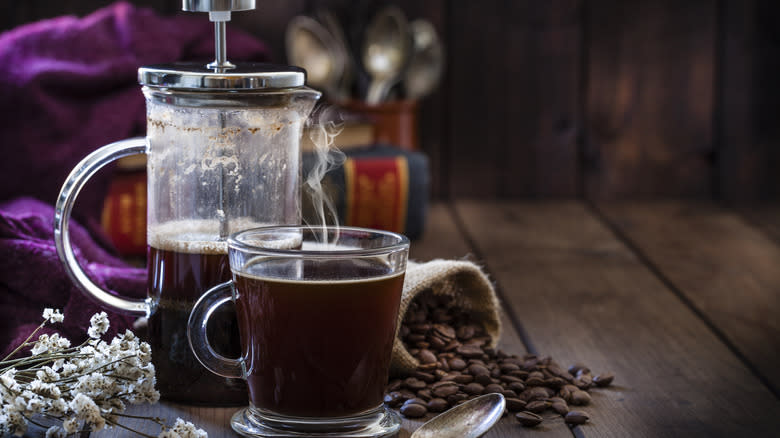
Have you ever eagerly brewed a cup of French press coffee, only to take that first sip and be met with an unexpected sour taste? It's a frustrating experience, to say the least, and can result in a lot of cups of subpar coffee. But before you toss your French press out the window, let's learn more about sour coffee and what causes it. The journey from coffee bean to cup is complex, and several factors can create that unwelcome sourness in your brew.
Under-extraction is a major cause of sourness in coffee. This is when the water hasn't extracted enough of the desirable flavors and compounds from the coffee grounds during the brewing process. It results in sour coffee because the water hasn't been able to dissolve and extract the full range of flavor compounds in the beans. As a result, the coffee lacks the richness and depth that properly extracted coffee offers. Grind size, water temperature, water-to-coffee ratio, and brew time can all cause sourness due to under-extraction. Then there are the coffee beans themselves. The beans' origin, roast level, and how fresh they are can cause a degree of sourness in coffee.
So, you can see there are many potential reasons your French press coffee tastes sour. Whether you're a coffee aficionado or just a casual morning sipper, understanding the reasons behind sour French press coffee means you can fix your issue and enjoy a better brew.
Read more: Coffee Mistakes You're Probably Making At Home
The Beans Are Ground Too Coarsely
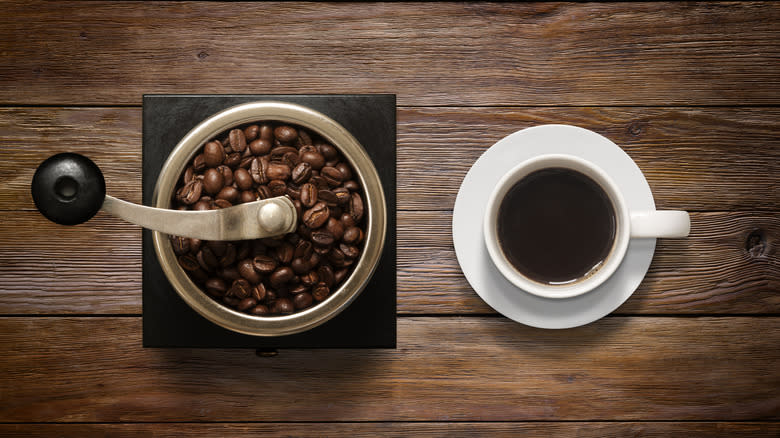
Sometimes, when you brew coffee using a French press, and it turns out sour, one of the culprits might be the coffee grounds being too coarse. You might have been told you need a coarse grind for French press coffee, but there is such a thing as too coarse. The coarser the grind, the smaller the surface area, and a small surface area can lead to under-extraction. This is because water gets less contact with all those tasty compounds and oils, and not all of them end up extracted into the brew. The acidic notes are extracted first, before the richer, deeper notes — and this can make coffee taste sour instead of nicely balanced.
If you suspect your coffee is too sour because of coarse grounds, there's an easy fix. You need to adjust your grind size to something finer. Gradually dial it down until you find that sweet spot where your coffee isn't overly sour. Most people recommend a coarse grind for French press coffee, but a medium-coarse grind can do the trick.
Remember, it's all about finding the right balance. You don't want to go too fine either, as that could lead to over-extraction, making your coffee bitter. So, play around with your grinder settings and test it out until you hit that Goldilocks zone — not too coarse, not too fine.
You've Used The Wrong Ratio Of Coffee To Water
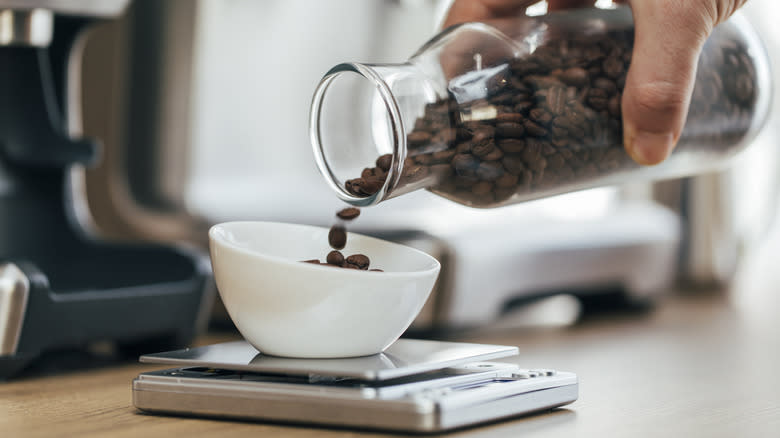
When brewing coffee using a French press, getting the right balance between water and coffee grounds is crucial. If you've added too little coffee for the amount of water, it can lead to sourness. A too-low coffee-to-water ratio means there's insufficient coffee to flavor the water properly. As a result, your coffee can taste sour because it's under-extracted, and the full range of flavor compounds haven't made their way into the finished brew.
So, what can you do to fix this? It's all about finding that sweet spot. Experiment with your coffee-to-water ratio. The standard rule of thumb for French press is around 1 gram of coffee for every 14 to 15 grams of water. However, this can vary based on your taste preferences. If your coffee is too sour, add more coffee grounds to your brew. We'd recommend using kitchen scales and weighing in grams rather than ounces, as you can be more precise with lower weights. If your coffee becomes too strong and bitter, you need to dial back the grounds or add more water.
The Brewing Temperature Is Too Low
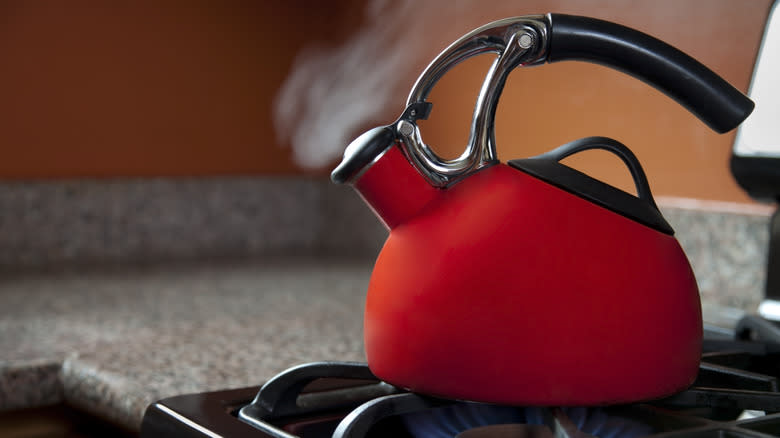
One sneaky culprit in this sour coffee saga could be the water temperature. When you're brewing coffee, the water temperature matters a lot. If it's too low, your coffee can end up on the sour side. But if the water isn't hot enough, it won't do the job of releasing all those flavorful oils and compounds in the beans, leading to under-extracted, sour coffee.
When the water temperature is below the ideal range (around 195 to 205 degrees Fahrenheit), it won't fully extract the flavors from your coffee grounds, causing sourness. What can you do about it? First, make sure your water is hot enough. Boil it and let it cool for about 30 seconds to hit that sweet spot in the temperature range. Or, invest in an electric kettle that lets you select the heating temperature.
But it's not just about the temperature of the water when it goes in the press; you need to maintain that temperature through the brewing process. One thing to try is preheating your French press with some hot water before emptying it, adding coffee and more water. This helps keep the brewing temperature stable. Or, if you find that your French press is losing heat too quickly during brewing, you can insulate it with a towel or switch to a press with an insulated carafe.
You Haven't Brewed Your Coffee For Long Enough

Another common reason for sourness in French press coffee is that you haven't brewed it long enough. Again, it's all about under-extraction. Hot water's job is to coax those flavors, oils, and compounds out of the grounds. But if you cut the brewing time short, you miss out on all the good stuff, ending up with sour coffee.
Coffee needs the right amount of brewing time to get things just right. But, the fix is simple — extend the brewing. Typically, for a French press, a brewing time of about 4 minutes is a good target. But if you're brewing your coffee for four minutes and it's coming out sour, try adding an extra minute to the clock and see how that goes. You might need to adjust the brew time slightly to find your sweet spot.
To make sure you're getting the right brew time consistently, use a timer. Start it as soon as you pour hot water over your coffee grounds, and stop it when you're ready to press down the plunger. By allowing your coffee the time it needs to fully steep and extract those wonderful flavors, you might be able to bid adieu to that sour note. It's all about patience and timing. Get it right and you'll unlock the secrets to a more balanced cup of joe.
You Didn't Stir
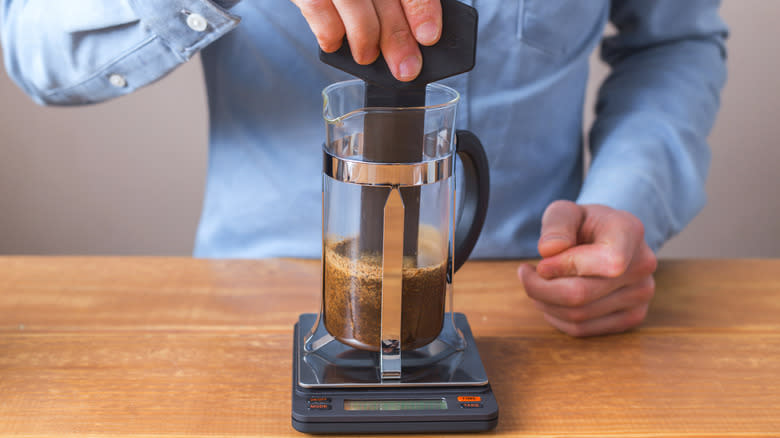
The most common causes of under-extracted coffee are beans ground too coarsely, incorrect coffee-to-water ratios, low brewing temperature, and short brew time. However, if you've changed all these factors and you're still experiencing sour coffee, the solution could be as simple as making sure you stir the ground coffee and the water together.
The coffee grounds and water need to mingle for proper extraction to happen. If you don't stir the coffee and water well, some parts of the grounds might get more attention than others. This uneven extraction means that some coffee bits will be over-extracted — resulting in bitterness — while others remain under-extracted — causing sourness. So, if something doesn't taste right, this could be the issue at hand.
What's great about this problem is that the fix is super simple. It's as simple as grabbing a long spoon or a stirrer and giving your coffee and water a mix. Make sure you get into all the nooks and crannies to ensure that every bit of coffee is well-soaked. Mix for around 15 to 30 seconds to get the water and coffee well-acquainted and then leave it to brew as you normally would.
The Beans Are Of Poor Quality
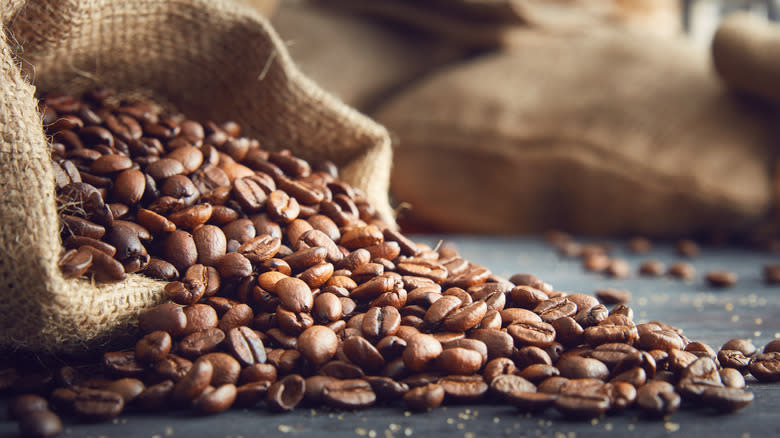
The sourness you're experiencing from your French press might be due to simply using coffee beans of poor quality. Coffee beans are the foundation of good coffee. The quality of those beans matters a lot. Lower-quality beans, often found in supermarket brands, can lack the complexity and balance of flavors that higher-quality beans offer. Although the way that this complexity manifests itself varies, in some cases, you can be left with sour-tasting coffee.
The simplest solution is to invest in better-quality coffee beans. Look for beans that are freshly roasted, and if possible, go for single-origin beans or blends from reputable roasters. Small artisan coffee companies are often the best place to look for beans. Plus, there are added benefits of buying from a small company, such as staff who are knowledgeable and can give you recommendations. Higher-quality beans are often roasted with care and offer a more balanced, enjoyable flavor.
In essence, the quality of your beans sets the stage for your coffee's flavor. By opting for better beans, you'll likely say goodbye to that sourness and enjoy a smoother, more satisfying cup of French press coffee.
The Beans Are Stale

Like all good things, coffee beans don't last forever. Over time, they start to lose their freshness and that's when things can go sour — literally. Stale beans can't deliver the rich, balanced flavors you want in your coffee. Instead, they tend to lean towards the sour side. It's like trying to bake a cake with expired ingredients — the end result isn't what you'd expect.
The best way to tackle the sourness caused by stale beans is to get yourself some fresh coffee beans. Look for beans with a recent roast date, ideally within the past 1 to 2 weeks. Then, to keep your beans as fresh as possible, store them in an airtight container in a cool, dark place. Avoid keeping them in the fridge or freezer, as coffee can absorb odors. Don't grind your beans until just before you intend to use them. What's more, coffee beans are at their best within the first few weeks after roasting. So, try to use up your beans relatively quickly to enjoy the fullest, non-sour flavors.
By switching to fresh beans and taking proper care of them, you'll likely find that your French press coffee loses that sour punch and becomes a more enjoyable, flavorful brew. It's all about starting with beans that are in their prime to ensure a satisfying cup every time.
The Beans Are Under-Roasted

Coffee beans start out green and go through a roasting process to develop their flavors. A chemical reaction known as the Maillard Reaction occurs during the coffee roasting process. This caramelizes the sugars and creates the delicious roasty, toasty flavor compounds that we associate with coffee. Under-roasted beans haven't undergone these changes properly, resulting in an underwhelming, sour brew.
The solution seems simple — opt for well-roasted beans. Look for beans that are labeled with the roast level you prefer, whether it's light, medium, or dark. But, of course, no roastery is going to own up to its beans being poorly roasted. Often, it'll just be a one-off issue with a particular batch. So, if you notice a brand of coffee you usually like tastes sour, it might just be a bad, under-roasted batch. Try a different coffee and see whether you get the same sour results. If not, it could be down to under-roasted beans. In this case, don't be afraid to contact the coffee company for a refund.
The pH Of The Water Is Too Low
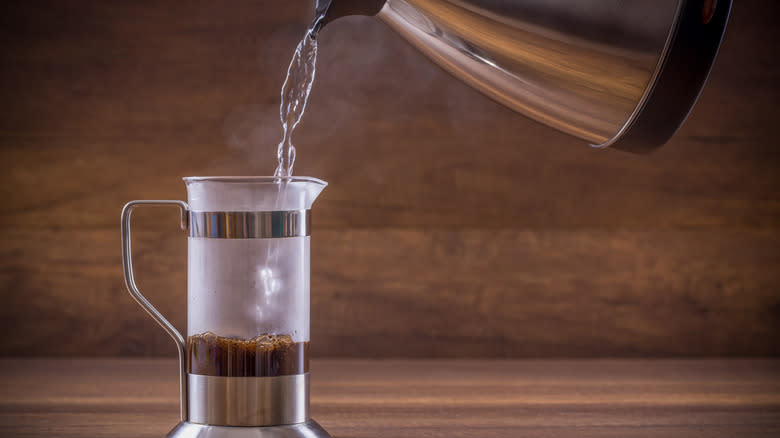
If you've tried everything else and your coffee still tastes sour, it could be down to problems with the water you're using. Although it extracts the flavors of coffee beans into it, water is still the main component of your finished brew — volume-wise, at least. So, it stands to reason that problems with the water can affect the flavor of your coffee.
It could be that the pH of the water you're using is too low, but what does this mean? The pH of water measures its acidity or alkalinity on a scale from 0 to 14, with seven being neutral. When your water is too acidic (has a pH lower than seven), it can contribute to sour flavors in your coffee. If your water is too acidic, it can tilt the scale towards sourness, just like too much lemon juice can make a dish taste tart.
Do you suspect your water's pH is too low? Well, you can use filtered or bottled water with a more neutral pH. You can also consider adjusting the pH of your tap water by using a water filter. By using water with a more neutral pH, you'll likely avoid that sour taste in your French press coffee. You need the right balance between acidity and alkalinity to create a satisfying cup of coffee.
You're Mistaking Acidity For Sourness
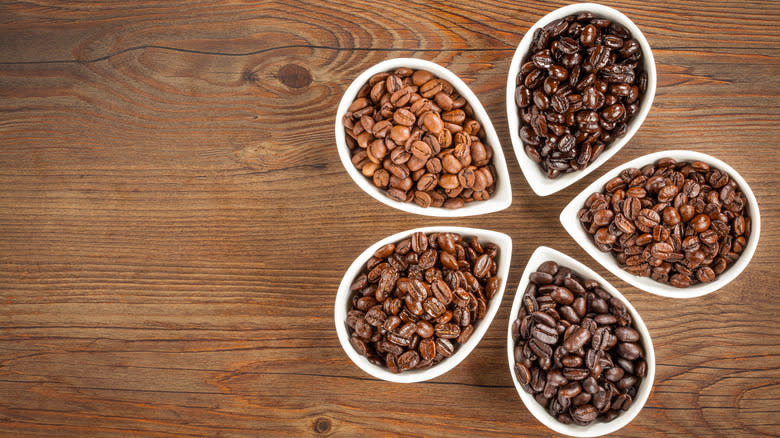
Coffee, just like a good wine, can have a certain level of acidity. This acidity isn't necessarily a bad thing — in fact, it can be a welcome, even sought-after, element of the coffee's flavor profile. It adds brightness and liveliness to the taste, similar to how lemon juice livens up a dish.
But, sometimes, the line between sourness and acidity can be thin. What you might interpret as sourness could actually be the coffee's natural acidity shining through. It's on the sourer end of the spectrum, but it's desirable rather than a mistake. Acidity can vary depending on the coffee beans' origin and roast level. Lighter roasts often have a more pronounced acidity, while darker roasts tend to mellow it out. Understanding your coffee's characteristics can help you appreciate the intended acidity.
Sometimes, it's a matter of getting used to it. Acidity in coffee can be an acquired taste. Give it a few tries, and you might find yourself enjoying the lively, citrusy, or fruity notes it brings. But, of course, it's totally okay if you're not a fan of coffee with an acidic flavor profile. Instead, you might prefer something with a richer, more balanced taste. Look for coffees with tasting notes such as chocolate and nuts rather than fruity or floral notes.
You're Mistaking Bitterness For Sourness

You're taking a sip of your freshly brewed coffee, and it hits you with an unexpected sharpness that you might describe as sour. But, hold on — it might not be sourness at all. It could actually be bitterness playing tricks on your taste buds. Sometimes, it's easy to mix up bitterness with sourness because both can bring that sharp, intense sensation. Bitterness, however, is more like the taste you get from unsweetened cocoa or dark chocolate. It's not like the tartness of a lemon.
Bitterness in coffee often comes from over-extraction, where the water has spent too much time or had too much contact with the coffee grounds, drawing out not just the desirable flavors but also the bitter compounds. So, it's actually caused by some of the opposite problems to those that cause sourness. It can be caused by using coffee that's ground too finely, water that's too hot, too much coffee to water, or a too lengthy brew time. As such, it's important to be able to identify the difference between bitterness and sourness. If you try some of the methods above to fix sourness in your coffee and what you're really tasting is bitterness, you'll only end up making your coffee even more bitter.
So, take the time to really think about what you're tasting. If it tastes burnt, earthy, or overly strong, you probably have bitter coffee on your hands.
Read the original article on Mashed.

